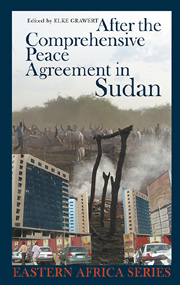Book contents
- Frontmatter
- Contents
- List of Tables & Figures
- Editor's Preface
- Notes on Contributors
- List of Acronyms
- Map of Sudan
- 1 Introduction
- I Implementation & Potential of the CPA
- 2 The Role of African & Arab Elites in Building a New Sudan
- 3 After the CPA
- 4 Empowered Deliberative Democracy (EDD)
- II Challenges Facing Post-war Societies in Sudan
- III The CPA in its Sub-regional Context
- IV Beyond the CPA
- Index
- EASTERN AFRICAN STUDIES
3 - After the CPA
The Implementation of Power Sharing at the National Level - the Case of the National Assembly
from I - Implementation & Potential of the CPA
Published online by Cambridge University Press: 05 April 2013
- Frontmatter
- Contents
- List of Tables & Figures
- Editor's Preface
- Notes on Contributors
- List of Acronyms
- Map of Sudan
- 1 Introduction
- I Implementation & Potential of the CPA
- 2 The Role of African & Arab Elites in Building a New Sudan
- 3 After the CPA
- 4 Empowered Deliberative Democracy (EDD)
- II Challenges Facing Post-war Societies in Sudan
- III The CPA in its Sub-regional Context
- IV Beyond the CPA
- Index
- EASTERN AFRICAN STUDIES
Summary
Introduction
The CPA contains regulations for the crucial issues of power sharing, wealth sharing and self-determination. In the power sharing protocol the two parties (NCP and SPLM/A) agreed to decentralise governance through a significant devolution of power to the 26 states within the federal system. Accordingly, the GONU exercises sovereignty over Sudan as a whole, and the ten states of the southern region are ruled through the GOSS, a primary responsibility of which is to wield authority in respect of the states of southern Sudan, to act as a link to the national government, and to ensure that the rights and interests of the people of southern Sudan are safeguarded during the interim period.
To date, the implementation of the CPA is moving at a slow pace. The intention of this chapter is to probe deeply into the challenges and the real causes of the delay, paying particular attention to underlying issues that affect the implementation of the power sharing agreement at the national level of the government of Sudan. In tackling these issues the following questions will be asked:
What are the challenges facing the implementation of the power sharing agreement at the national level?
Are the political parties participating at the national level able to control decision-making and policy formulation and to increase political participation?
Which other groups are involved in decision-making and policy formulation, and in which ways?
How do they interrelate with the ruling political parties?
- Type
- Chapter
- Information
- After the Comprehensive Peace Agreement in Sudan , pp. 51 - 61Publisher: Boydell & BrewerPrint publication year: 2010

